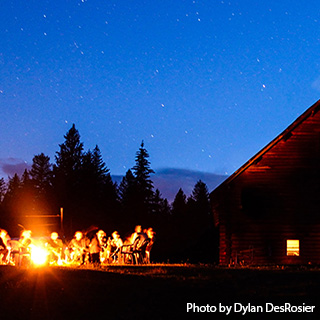Wyss Scholarships
Each year, the The Bolle Center helps administer the Wyss Scholars Program. The Wyss Scholars Program identifies and nurtures a new generation of leaders on western land conservation issues by providing financial support to students who are enrolled in either the College of Humanities and Sciences or W.A. Franke College of Forestry and Conservation participating degree programs, the School of Law, or the School of Business Administration, who are committed to careers as practicing conservationists of western land, either with a federal, tribal or state land management agency or a non-profit conservation group working in the region. A Call for Applicants is usually issued each October. Applications are due in early January and announcements made early in the spring semester.
Wyss Scholarship Process
Wyss Scholars Program for the Conservation of the American West
All master's students who began in the fall in any of our W.A. Franke CFC masters degree programs and working on projects related to conservation in the U.S. West are eligible to apply for a Wyss scholarship co-administered by the Environmental Studies Program (EVST) and the Bolle Center at the W.A. Franke CFC. Deadline for 2017 applications has passed. Stay tuned for information on the 2018 Wyss Scholar awards.
The Wyss Foundation is a private, charitable foundation dedicated to land conservation in the Intermountain West. The Wyss Scholars Program seeks to identify and nurture a new generation of leaders on western land conservation issues by providing financial support to Master’s degree students who are enrolled in participating programs/departments named above, and who are committed to careers as practicing conservationists of western land, primarily with a federal or state land management agency or a non-profit conservation group working in the region.
Two Wyss Scholars will be selected from the College of Humanities and Sciences (Environmental Studies) and/or the W.A. Franke College of Forestry and Conservation on the basis of their leadership potential, commitment to furthering land conservation in the Intermountain West, commitment to pursuing a career as a practicing nonprofit or public-sector conservationist, and their academic strength. Selected students must be registered as full-time students and consider taking one course from the graduate EVST engagement requirement courses (activism courses); one course in land use planning, natural resource law or environmental law; and one course in negotiation, conflict resolution, collaboration.
